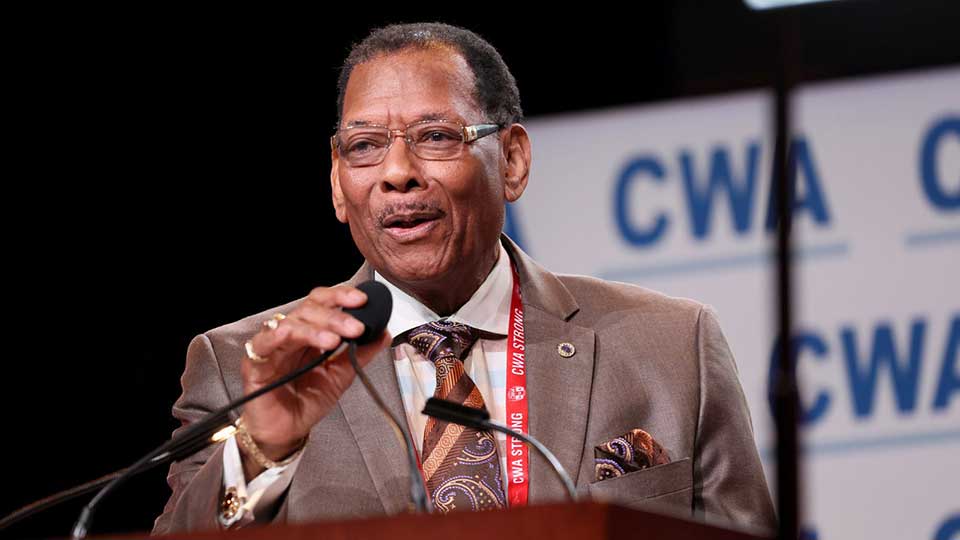
ST. LOUIS —Veteran union leader Claude Cummings Jr., 71, won a runoff late on July 10 for the presidency of the Communications Workers, becoming the influential and progressive union’s first-ever African American in its top job and its first-ever Southerner.
Cummings is the union vice president who leads CWA’s District 6, headquartered in Austin, Texas, and was the longtime president of Houston-based Local 6222. He defeated Ed Mooney, the union vice president and leader of mid-Atlantic District 2-13.
Cummings succeeds current President Chris Shelton, who is retiring at the end of this convention, on July 13, in St. Louis.
Mooney suffered from credible accusations, disclosed by an outside investigating panel after complaints from nine former and present local leaders of sexual harassment, dislike of gays, bullying, intimidation, and retaliation against foes within the union.
Under pressure from the union board over those charges, Mooney agreed two weeks ago with a Shelton demand that he go for counseling. What did not change was that Mooney was the “favorite” of the telecom workers and that he was the prototypical older white guy.
Runoff vote percentages were unavailable, but reports of results of the first round of balloting eliminated a third candidate, current Secretary-Treasurer Sara Steffens, who reportedly received 14% of the vote to 46% for Mooney and 40% for Cummings.
The victory for Cummings keeps the leadership of the union in the hands of a telecom worker, and the candidate with the longest union experience—50 years—a point he emphasized in his campaign. Steffens, a News Guild member, would have been the union’s first woman in the top job and the first non-telecom worker.
On his campaign website, Cummings stressed coalition-building with like-minded organizations, specifically mentioning the NAACP and the A. Philip Randolph Institute, one of two AFL-CIO constituency groups for African-American workers. He also now heads the union’s Human Rights Department.
Nominating Cummings, current Local 6222 President Ray Rodriguez said Cummings “fights for workers regardless of age, ethnicity, religion or sexual orientation.”
Cummings “will never never never ever back down or walk away from an opportunity to make our members’ lives better,” Rodriguez declared. “He will always file lawsuits and” National Labor Relations Board ”charges to protect our members.” Local 1027 President Ken McNamara, who seconded the nomination, said Cummings creates the coalitions he cites in his campaign “to fight at a time when the employer class is attacking the working class.”
As president, Cummings will face a number of challenges. The largest one is the declining numbers of the union’s largest sector, telecom workers like himself. Once a virtually all-telecom union, CWA now has a declining plurality of telecom workers.
That’s due to the combination of the 1984 breakup of “Ma Bell,” AT&T into smaller regional companies—including its vestige—the need for fewer telephone line installers thanks to a switch to fiber optic cables and consumers’ preference for cell phones, company outsourcing of call centers overseas and CWA’s own efforts to unionize other professions.
Thus what was once a telecom-only union when it was founded just after World War II now includes Electrical Workers (IUE), journalists and non-profit firm workers (The News Guild), state and local health care workers in New Jersey and Texas, the Association of Flight Attendants, the Broadcast Employees and Technicians and college and university grad student researchers, resident assistants, and teaching assistants.
And reflecting the new economy of the Internet and its offshoots, CWA is organizing code workers, including one group of 100 who won unionization with it during the convention.
But all this has cut the number of high-paying telecom jobs and the union has been forced to tighten its belt. It underwent a two-year wage and hiring freeze and reduced travel costs. Budget cuts over the last two years left its sectors—such as NABET and the News Guild—with far fewer dollars than they had before 2021.
The News Guild’s allotment from the CWA budget dropped by one-fifth, for example, in two years, in actual dollars before discounting for inflation.
With Cummings, Steffens, and Mooney all seeking the top job, those three seats on the CWA board, including the #2 job of Secretary-Treasurer, opened up, as did others due to retirements. Ameena Salaam, an executive assistant to Shelton, will succeed Steffens as Secretary-Treasurer.












Comments